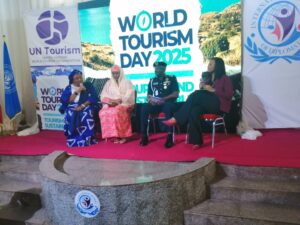By: Goodluck E. Adubazi, Abuja.
Nigeria is on the cusp of a tourism transformation, with projections showing that the sector could generate over $5 billion in revenue and create more than 5,000 jobs within the next five years. This was disclosed during a keynote address delivered at the World Tourism Day 2025 celebration held on September 26, 2025, in Abuja, and organized by the International Society of Diplomats (ISD).
Rev. Chidi Jacob, consultant to the Senate Committee on Tourism, revealed this during the event, stressing that with coordinated stakeholder efforts and the creation of a sustainable market, tourism could become a major economic driver for Nigeria.
“Tourism presents immense potential for economic growth, employment, and cultural exchange. With the right synergy, Nigeria can become a key destination on the global tourism map,” Rev. Chidi stated.

“No Tourism Without Security” –NSCDC Commandant Stresses Safety First
The event also highlighted the critical role of security in tourism development. The FCT Commandant of the Nigeria Security and Civil Defence Corps (NSCDC), Olusola Odumosu, emphasized that safety must remain a top priority for national growth and tourist confidence.
“Security and tourism go hand in hand. You cannot have one without the other,” Odumosu said. “Nigeria is one of the safest places to live, and we must continue projecting that image to the world.”
Tourism as a Diplomatic Tool: ISD Calls for Cultural Exchange and Cooperation
In his welcome address, Professor Edet Ekpenyong, Nigeria’s Country Director and Head of Mission for the ISD, described the event as a platform to redefine tourism diplomacy in Nigeria’s foreign and economic policy landscape.
“We have localized the global theme to focus on ‘Understanding Tourism Diplomacy in International Relations’ – a call to rethink how tourism can be used to promote peace, sustainability, and cultural cooperation,” Prof. Ekpenyong noted.
The United Nations World Tourism Day is marked annually on September 27, celebrating the global impact of tourism on development, sustainability, and international unity. The day has been observed since 1980, following the adoption of the UNWTO Statutes in 1970.
Africa Must Reclaim Its Tourism Narrative, Prof. Dinesh Sabnis
Speaking virtually, Prof. Dinesh Sabnis, Special Envoy to the UN in Geneva and Vienna and Deputy Secretary-General of ISD, delivered a strong message on the need to decolonize global tourism narratives.
“Tourism has long reflected global inequality. Too many tour narratives glorify colonizers while erasing the stories of the colonized,” Sabnis said. “Africa is not a continent waiting to be discovered—it is the birthplace of civilization.”
He criticized the global tourism industry for continuing to profit from African resources and heritage without giving ownership or proper recognition to local communities.
“It’s time we stop being consumers of our own creations and start being owners of their value,” Sabnis added.
Tourism as a Catalyst for Africa’s Reconnection and Growth
Sabnis also called for a reimagined tourism diplomacy that rebuilds historical African connections severed by colonial borders and restores pride in Africa’s role in shaping global civilization.
“From Timbuktu to Cairo, from Cameroon to Khartoum—Africa has always been a cradle of knowledge, trade, and innovation. Tourism can be the bridge to reconnect these legacies,” he asserted.
The event also featured remarks from Amb. Phil Roberts, Alhaji Dr. Aliyu Badaki, President of the Federation of Tourism Associations of Nigeria (FTAN), and a Regional Manager of the Bank of Industry.
All echoed the call for increased investment, policy support, and public-private collaboration to unlock Nigeria’s tourism potential.
“We must dare to reinvent the future,” urged FTAN President Alhaji Dr. Badaki. “Tourism isn’t just about travel; it’s a national asset that can reshape our economy and image.”
The ISD event underlined that tourism is more than leisure—it is a driver of diplomacy, sustainability, and global understanding. The call to action was clear: integrate tourism into national planning, embrace digital platforms, and respect cultural heritage.
With Nigeria positioning itself for a tourism-driven future, stakeholders believe that the country is poised to become a major player in global tourism, not just as a destination, but also as a voice for inclusive, decolonized, and sustainable tourism.
The event concluded with the signing of an MoU between the International Society of Diplomats and the European Union of Culture and Tourism, followed by a high-level panel session.